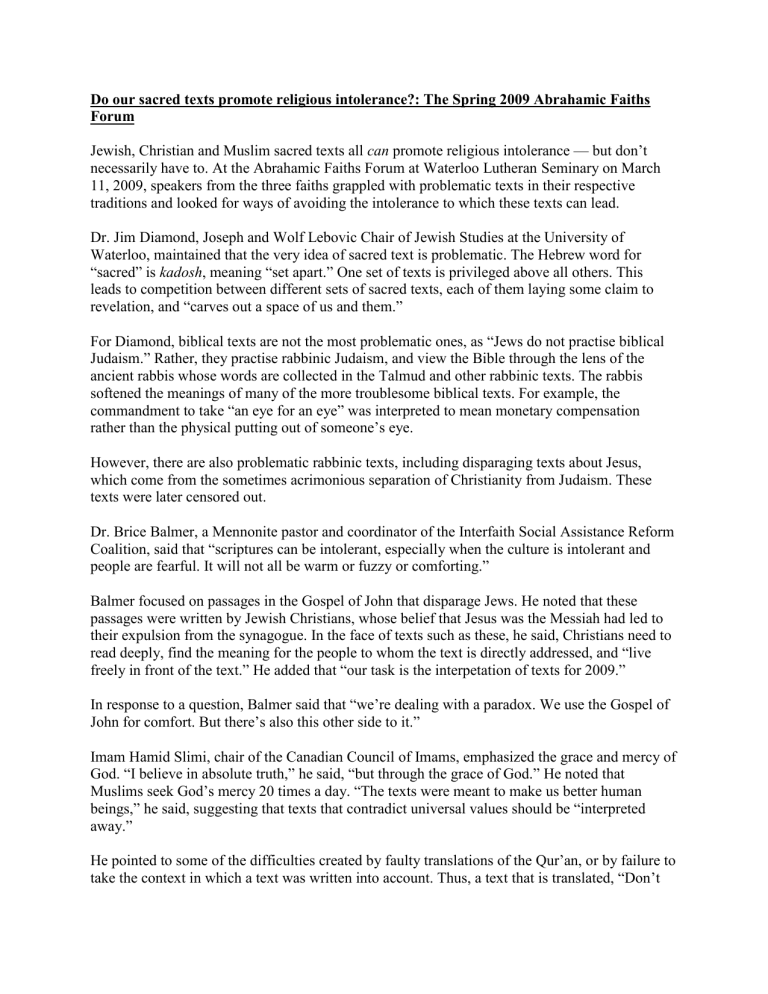Do our sacred texts promote intolerance?

Do our sacred texts promote religious intolerance?: The Spring 2009 Abrahamic Faiths
Forum
Jewish, Christian and Muslim sacred texts all can promote religious intolerance — but don’t necessarily have to. At the Abrahamic Faiths Forum at Waterloo Lutheran Seminary on March
11, 2009, speakers from the three faiths grappled with problematic texts in their respective traditions and looked for ways of avoiding the intolerance to which these texts can lead.
Dr. Jim Diamond, Joseph and Wolf Lebovic Chair of Jewish Studies at the University of
Waterloo, maintained that the very idea of sacred text is problematic. The Hebrew word for
“sacred” is kadosh , meaning “set apart.” One set of texts is privileged above all others. This leads to competition between different sets of sacred texts, each of them laying some claim to revelation, and “carves out a space of us and them.”
For Diamond, biblical texts are not the most problematic ones, as “Jews do not practise biblical
Judaism.” Rather, they practise rabbinic Judaism, and view the Bible through the lens of the ancient rabbis whose words are collected in the Talmud and other rabbinic texts. The rabbis softened the meanings of many of the more troublesome biblical texts. For example, the commandment to take “an eye for an eye” was interpreted to mean monetary compensation rather than the physical putting out of someone’s eye.
However, there are also problematic rabbinic texts, including disparaging texts about Jesus, which come from the sometimes acrimonious separation of Christianity from Judaism. These texts were later censored out.
Dr. Brice Balmer, a Mennonite pastor and coordinator of the Interfaith Social Assistance Reform
Coalition, said that “scriptures can be intolerant, especially when the culture is intolerant and people are fearful. It will not all be warm or fuzzy or comforting.”
Balmer focused on passages in the Gospel of John that disparage Jews. He noted that these passages were written by Jewish Christians, whose belief that Jesus was the Messiah had led to their expulsion from the synagogue. In the face of texts such as these, he said, Christians need to read deeply, find the meaning for the people to whom the text is directly addressed, and “live freely in front of the text.” He added that “our task is the interpetation of texts for 2009.”
In response to a question, Balmer said that “we’re dealing with a paradox. We use the Gospel of
John for comfort. But there’s also this other side to it.”
Imam Hamid Slimi, chair of the Canadian Council of Imams, emphasized the grace and mercy of
God. “I believe in absolute truth,” he said, “but through the grace of God.” He noted that
Muslims seek God’s mercy 20 times a day. “The texts were meant to make us better human beings,” he said, suggesting that texts that contradict universal values should be “interpreted away.”
He pointed to some of the difficulties created by faulty translations of the Qur’an, or by failure to take the context in which a text was written into account. Thus, a text that is translated, “Don’t
turn to a Jew or Christian for friendship” actually means “Don’t turn to a Jew or Christian for religious advice.” And a text about fighting takes on a different meaning when it is placed in the context of a warrior fighting the Mongol invaders who ravaged the Islamic world in the Middle
Ages.
Waterloo Lutheran Seminary presents two Abrahamic Faiths Forums each year, with the fall forum focusing on a person who is of interest to all three faiths and the spring one focusing on a broader topic.







